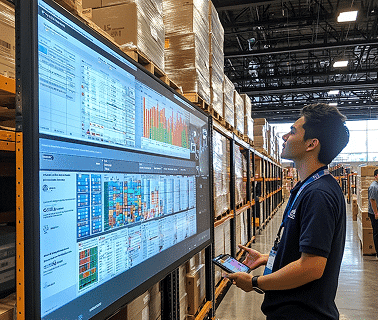Listen to this blog
Supply chain management coordinates the flow of goods, services, and information between an organization and its suppliers, partners, and customers. The main goal of supply chain management is to create value for all stakeholders by reducing costs and increasing customer satisfaction.
Supply chain management helps organizations manage their supply chains more efficiently by optimizing inventory levels, reducing costs and wastage, improving product quality and delivery times, reducing environmental impact (through better logistics), improving productivity through lean manufacturing techniques, and reducing risk exposure (by using fewer suppliers).
Who is a supply chain manager?
Supply chain managers are the people who oversee the procurement, production, and delivery of products. They’re responsible for ensuring that all parts of the supply chain are working together smoothly, and they ensure that their company has enough inventory to meet demand without wasting resources.
Want more detailed information on supply chain? Check out our detailed blog on the syllabus covered in supply chain management course.
Responsibilities of a supply chain engineer
Supply chain engineers are responsible for a wide range of duties, from designing and implementing new ways to streamline supply chains to analyzing the data from these processes.
The responsibilities of a supply chain engineer include the following:
- Collaborate with Sales, Operations, and Customer Service teams
A supply chain engineer needs to be able to work with people from many different departments within an organization. They must collaborate with sales teams to understand what inventory needs should be based on customer demand and what kind of inventory shortages or overages might occur due to changes in business patterns (such as holidays).
Finally, a supply chain engineer will work directly with customer service representatives so that they can make sure that any problems customers have during shipping are resolved quickly and efficiently without causing damage to goods.
- Overall supply chain strategy
Supply chain engineers are responsible for the overall strategy of the supply chain. This includes analyzing the current state of the supply chain and making decisions on how to improve it. They also need to identify issues that might affect the efficiency of the supply chain, such as poor inventory management or inefficient transportation methods.
Supply chain engineers collaborate with Sales, Operations, and Customer Service teams to develop strategies that will help improve their company’s bottom line. They may also work with external stakeholders like suppliers or suppliers’ suppliers to help them improve their processes so they can meet customer expectations better.
Want to know the importance of blockchain in SCM? Check out our blog on use of blockchain in SCM for more information.
- Determine key supply chain KPIs
The supply chain engineer is responsible for determining a company’s supply chain’s key performance indicators (KPIs). These include metrics like delivery time and cost, customer satisfaction, inventory levels, and more. The supply chain engineer must also recognize which KPIs are most important for their organization’s specific needs and goals.
- Identify process bottlenecks and implement solutions.
The supply chain engineer works with the other members of management to identify the bottlenecks in their organization’s processes. This can be done through data analysis or by observing the flow of materials through the system. Once they’ve identified these bottlenecks, they will work with others to implement solutions that will help improve overall efficiency while meeting customer needs.
Want to know the top trends in the supply chain industry? Check out our blog on trends in SCM for more information.
- Documentation
The supply chain engineer must document the operations in the supply chain. They are responsible for keeping records of the various activities and processes in the supply chain, including workflow, customer service performance, inventory management, and delivery planning. They also have to create and maintain documents such as procedure manuals, quality control plans, and training materials.
- Train and evaluate others
Supply chain engineers must train employees on new products/services, how to use new technologies, and evaluate their performance periodically. They may also be required to supervise employees who work under them, so they need good people management skills to get the most out of their teams efficiently.
- Provide constructive feedback
Supply chain engineers must provide constructive feedback when they notice someone doing something wrong so they can help improve their performance or prevent mistakes from happening again in the future.
Want to relation between supply chain management and operations management? Check out our blog on SCM and operations management for more information.
- Work with different departments to get vendors.
Supply chain engineers are responsible for building relationships with vendors and distributors. They work with the finance, sales, and manufacturing teams to determine each product’s most effective distribution methods. For example, a supply chain engineer might work with the finance team to decide whether or not it’s cheaper for a company to use its warehouses or rent space from a third party.
- Build and maintain good relationships with vendor
Supply chain engineers must also maintain positive relationships with vendors to ensure they have access to the best products at reasonable prices. This means they need to communicate effectively with these partners to get what they need when they need it.
How to become a supply chain engineer?
If you’re interested in becoming a supply chain engineer, there are several steps that you can take.
- A Bachelor’s degree in Business (Logistics and Supply Chain Management) is required. This degree will prepare you for the job by teaching you about supply chain management, inventory management, and logistics.
- Work in customer support, logistics, or business management for at least 3-5 years. After completing your Bachelor’s degree, get some experience working in the field before applying to graduate school.
- Consider taking additional courses such as one-year online PGCP in Supply Chain Management from Manipal Academy of Higher Education (MAHE).
Want to know more detailed information on how to become a supply chain specialist? Check out our blog on how to become a supply chain engineer for more information.
Pursue PGCP in SCM with Online Manipal
PGCP in SCM with Online Manipal is the most comprehensive course available in this domain. Experts design the course curriculum with years of experience teaching and training students. The course covers all the essential topics related to Supply Chain Management, including supply chain planning, procurement and sourcing, inventory management, logistics management, distribution, and transportation management, customer relationship management (CRM), and supply chain information system (SCIS).
Conclusion
Whether you’re an experienced professional looking to expand your career options or someone who wants to make a new start, pursuing a supply chain management program at Online Manipal is an excellent choice. We offer an online program that’s flexible enough to fit into any schedule, and our faculty are committed to helping you succeed in every way possible.
We look forward to seeing what you do with your supply chain management education!
Key takeaways:
- SCM Engineers have to solve complex problems using the best possible solutions.
- SCM Engineers are required to work closely with businesses, as they help them find the most effective ways to manage their supply chain.
- SCM Engineers are responsible for designing, building, and maintaining systems that help companies optimize their supply chain operations.
Prepare for your next career milestone with us







